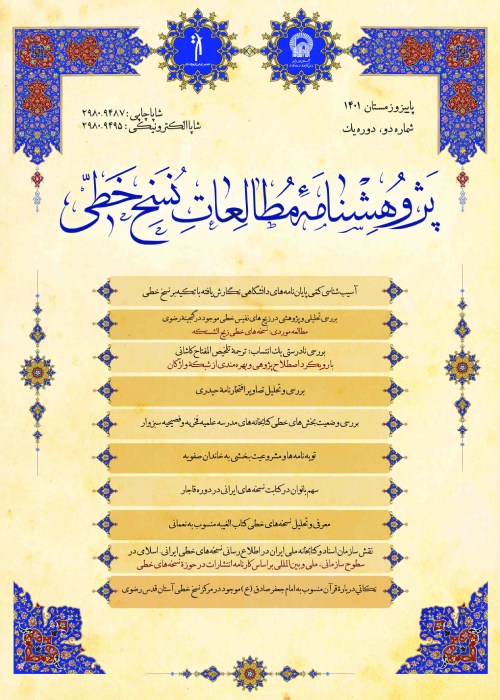Letters of Repentance and Legitimization of the Safavid Dynasty
The present research is intended to investigate the process of legitimization of Safavid dynasty in the interaction between sultan and jurist or, in other words, to explain the process of Safavid rule’s turning legal-conventional with centrality of repentance.
Research method/approach:
This writing is entirely based on the fundamental theory and the survey of those who have experienced this process. Accordingly, the present research, by simultaneous analysis and continuous comparison between the data during the research process and by relying on inductive thinking with an emphasis on creating concepts (Islamic rule, jurist, Sultan [just, unjust], justice, welfare, security, criminal law, the rights of Allah, the rights of people, enjoining good and forbidding evil, repentance, etc.) has established a relationship between these categories and by taking into consideration the comparative thinking simultaneous to them, has explained, supported, deduced and produced the theory proposed during the research process.
The principles of the legitimacy of the Safavid rule have been examined, with an emphasis on the documents of repentance left among the anthologies, manuscripts and stone edicts of the congregational mosques of the Safavid era. From among these, 4 cases are from the letters of repentance of Safavid kings, 4 cases are from the emirs and commanders of the Safavid army, and one case includes the repentance of the public. The process of compiling the Shi’a political jurisprudence following the efforts of Shi’a jurists and planning the principles of interaction with sultans, both unjust and just, upon the rise of the Shia Safavid rule, practically brought the jurists into a new phase concerning the implementation of the legal rulings of Shi’a jurisprudence. The jurisprudential-political theory proposed by some Safavid scholars such as Muḥaqqiq al-Karakī led to the formation of a new political-jurisprudential literature in the field of Shi’a political thought. One of these discourses, and in fact the most fundamental and the most important of them, which first led to the strengthening of the Safavid government and, prior to it, the strengthening of the political, legal and conventional status of the jurists and making the government more jurisprudential, is the discourse of repentance. Examining the status of repentance and the content classification of repentance documents shows that the process of writing repentance letters, especially after the repentance of the Safavid Shah Tahmasab I, remained as an official principle during the Safavid era and it is very likely that the history of repentance as a principle of avoiding sin has had a special place in all religions and initiation rites, but the expansion of this discourse from the era of the Ilkhanids onwards with the expansion of Sufism and the Sufi orders and the spread of mystical and Sufi texts has been effective in the examination of the documents of the letters of repentance. Besides, the outcomes of repentance in the society for people in the form of security and public interest plans have led to the issuance of a series of decrees comprising of various subjects such as the decrees of tax exemptions and decrees of prohibiting taboos such as drinking alcohol.
- حق عضویت دریافتی صرف حمایت از نشریات عضو و نگهداری، تکمیل و توسعه مگیران میشود.
- پرداخت حق اشتراک و دانلود مقالات اجازه بازنشر آن در سایر رسانههای چاپی و دیجیتال را به کاربر نمیدهد.


